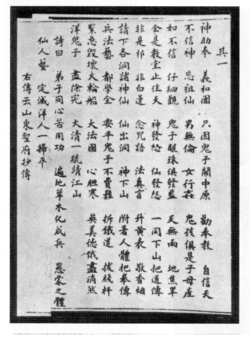- Chinese spirit possession
-
Chinese spirit possession is the paranormal/supernatural and sorcerical event in which, allegedly, when Chinese spirits, or gods such as Jade Emperor, Xi Wangmu, Sun Wukong, Dragon King, Nezha (deity), Guanyin, Guan Yu, or other disincarnate or extraterrestrial entities take control of a human body, resulting in noticeable changes in body functions and behavior. It was alleged that once the spirit possession take place, the practitioners would be granted supernatural powers like Firewalking, handling red-hot steel rods without getting burnt, and withstanding sharp knife attacks without being cut open. The most famous Chinese spirit possession practitioners were to be found in Boxer Rebellion in the 1900s, when boxers claimed to be invulnerable to sharp knife, gunshots and cannon fire.
Contents
History
The State of Qi had shamans who claimed to be possessed by spirits, and they were criticized as heterodox by Confucians. These spirit possession movements often led peasant rebellions during Imperial Chinese history. The Boxer Rebellion was one of many peasant movements that had shamans who claimed to be possessed by spirits.[1] For the Boxers during the Boxer rebellion, spirit possession was used for protective purposes.[2]
Spirit possession ritual
Larry Clinton Thompson, in his book "William Scott Ament and the Boxer Rebellion: Heroism, Hubris and the ”Ideal Missionary”, has detail description of the spirit possession practiced by Chinese boxers:
... whirling and twirling of swords, violent prostrations, and chanting incantations to Taoist and Buddhist spirits. When the spirit possession had been achieved, the boxers would obtain invulnerability and superhuman skills with swords and lance. [3]Mystical incantations
- (1) Incantation to invite the coming of spirits.
- (2) Incantation to provide protection against spear and fire.
- (3) Incantation to provide protection against any outside attack.
Spirit possession practitioners claimed that once these incantations were chanted, Chinese spirits would descend to offer protection, so that cannon fire or gun shots would not harm the human body.[4]
Shaman
In Taiwan, the Republic of China, shamans who claim to be possessed by ancient spirits still exist. They are known as Jitong. Many people still ask them for advice. Among the "spirits", the Shamans claim they can channel are Chinese historical figures such as Ji Gong, Santaizi, and other spirits, including non-Chinese ones, like Jesus.[5][6]
Paranormal claims
- (1) Thunder bolts in the palm (Chinese:五雷掌).
- (2) Climbing ladder made of sharp knifes (Chinese:上刀山)
- (3) Invulnerable to gunshots, cannon fire, and knife attack.
- (4) Ability to command divine spirit warriors.
See also
- Wu (shaman)
- Necromancy
- Spiritualist Church
- Spiritism
- Automatic writing
- Automatic drawing
- Obsession (Spiritism)
- Demonic possession
- Demonology
- Spirit possession
- Post-abduction syndrome
- Witchcraft and divination in the Bible
- Pentecostalism
Reference
- ^ Joseph Esherick (1988). The origins of the Boxer Uprising. Berkely California: University of California Press. p. 39. ISBN 0520064593. http://books.google.com/books?id=jVESdBSMasMC&pg=PA39&dq=chinese+spirit+possession&hl=en&ei=qxrLTN3TJoO8lQebuPTMCg&sa=X&oi=book_result&ct=result&resnum=10&ved=0CF4Q6AEwCQ#v=onepage&q=chinese%20spirit%20possession&f=false. Retrieved 2010-06-28.
- ^ Paul A. Cohen (2003). China unbound: evolving perspectives on the Chinese past. Psychology Press. p. 95. ISBN 0415298237. http://books.google.com/books?id=IocTJ8aGQeAC&pg=PA95&dq=chinese+spirit+possession&hl=en&ei=qxrLTN3TJoO8lQebuPTMCg&sa=X&oi=book_result&ct=result&resnum=3&ved=0CDkQ6AEwAg#v=onepage&q=chinese%20spirit%20possession&f=false. Retrieved 2010-06-28.
- ^ Thompson, Larry Clinton. William Scott Ament and the Boxer Rebellion: heroism, hubris and the " Ideal Missionary". McFarland & Company. ISBN 9780786440085. http://books.google.com/books?id=5K9BN96p1hcC&printsec=frontcover&dq=Boxer+Rebellion&hl=zh-CN&ei=9oTSTMmTNJH0vQOVvJS_Dw&sa=X&oi=book_result&ct=result&resnum=1&ved=0CCwQ6AEwADgK#v=onepage&q&f=false.
- ^ 侯宜傑 (2010-10-08). 「神拳」義和團的真面目. 秀威資訊科技股份有限公司. p. 151. ISBN 13 /9789862215319. http://books.google.com/books?id=3FP92a7ACSQC&pg=PA296&lpg=PA296&dq=%E5%A4%A9%E6%B4%A5%E6%8B%B3%E5%8C%AA%E5%8F%98%E4%B9%B1%E7%BA%AA%E4%BA%8B&source=bl&ots=WTHeBzFt_9&sig=OmXRWLLoRBxXfL4qlPk8WNGpAEI&hl=zh-CN&ei=7X3WTLO7OIiKvgOH_JW4CQ&sa=X&oi=book_result&ct=result&resnum=9&ved=0CD8Q6AEwCA#v=onepage&q=%E5%A4%A9%E6%B4%A5%E6%8B%B3%E5%8C%AA%E5%8F%98%E4%B9%B1%E7%BA%AA%E4%BA%8B&f=false.
- ^ Jonathan Adams (10 November 2008). "As demand shrinks, shamans update their style". THE NEW YORK TIMES. http://www.nytimes.com/2008/11/10/world/asia/10iht-shaman.1.17683444.html.
- ^ JONATHAN ADAMS (6 December 2008). "Shaman Channels 12th Century but Adapts to 21st". THE NEW YORK TIMES. http://www.nytimes.com/2008/12/07/world/asia/07shaman.html?ref=asia.
Categories:
Wikimedia Foundation. 2010.

